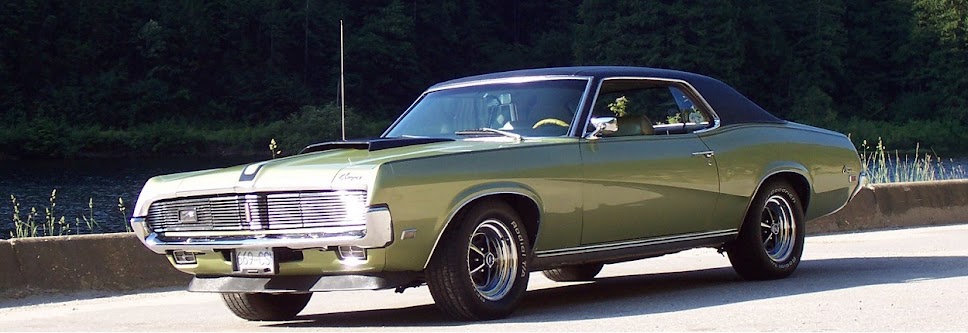October, 2004 By Eric English
Photography by Eric EnglishWhile the Cougar was marketed to an upscale audience, an alter ego could be found in the low-production Eliminator model. Eliminators were primarily a cosmetic package often paired with mainstream 351 powertrains. Check the right boxes, however, and you could have a hardcore performance engine to go along with the Eliminator's brilliant colors, spoilers, hoodscoop, and special trim-the brainchild of the legendary Larry Shinoda.
Take John Benoit's '70 featured here, which was ordered with the ace of all Ford small-blocks-the Boss 302. the Competition Blue beauty is paired with a four-speed Top loader and backed by a bulletproof 9-inch rearend assembly, carrying 3.50 gears and a Traction-Lok differential. Add staggered shocks, a N-case carrier, and 31-spline axles, and you have one bad cat just the way it was assembled some 34 years ago.
 One would have to call Benoit more than just your average Cougar buff, as the desirable Mercurys are the main interest at his Cascade Classics restoration business in Edgewood, Washington. Benoit has owned a variety of the models, including Eliminators, GTEs, XR7Gs, and more. he's also been responsible for any number of top-flight restorations.
One would have to call Benoit more than just your average Cougar buff, as the desirable Mercurys are the main interest at his Cascade Classics restoration business in Edgewood, Washington. Benoit has owned a variety of the models, including Eliminators, GTEs, XR7Gs, and more. he's also been responsible for any number of top-flight restorations.Benoit came by this particular '70 in 1999. he had seen the car in a national competition earlier in the decade. The Eliminator looked terrific as it rolled off the transporter at Benoit's shop, but a more thorough evaluation quickly evolved into disassembly and a freshening to the highest standards. The average hobbyist would have found little fault with the car, but when Cougars are your calling card in life, you want to put your best foot forward. To that end, Brandon Huhtala at Automotive Images applied a new two-stage topcoat. the reassembly involved boxes of N.O.S. trim and chrome. As you can see, the results are nothing short of staggering; a fact borne out by the car achieving 498 out of 500 points at the 2000 Cougar Club of America Nationals.
It's worth noting while the musclecar heavyweight 428CJ was available in all Cougar models, the Boss 302 could only be had with the Eliminator package. In fact, according to Kevin Marti (www.martiauto.com), just 469 Boss Eliminators were assembled during the '70 model year-a mere fraction of the 7,000-plus Boss 302 Mustangs built during the same period. Hardware was pretty much the same for the FoMoCo cousins; the only available transmissions were close-ratio or wide-ratio Top loader four-speeds. An exception to their similarities: the Boss 302 Mustang was available with a Ram-Air, but the Boss 302 Cougar Eliminator was not.
Turning to the interior of Benoit's Eliminator, we see the optional Decor Group trim and eight-track tape player, along with the 8,000-rpm tach dash that came in all Boss Cougars. A factory T-handled Hurst stick actually works Ford linkage, stirring the close-ratio cogs that proved the most popular choice on '70 Boss 302s (Mustang or Cougar). Styled steel wheels were original equipment as well, and mount some of the most popular OE skins of the era-raised white letter Goodyear Polyglas GTs in an F70-14 size.
the Boss 302/Eliminator combination might appear to make strange bedfellows, as the high-rev small-block was primarily a homologation exercise for Ford's Trans-Am race teams, in which the '69-'70 Cougars were not involved.
Three decades later, little has changed, and that's just the way John Benoit and other Boss Cougar fans like it.
PRODUCTION
(courtesy of Marti Autoworks)
1969 1970
Boss 302 Mustang 1,628 7,014
Boss 302 Eliminator 169 469

No comments:
Post a Comment